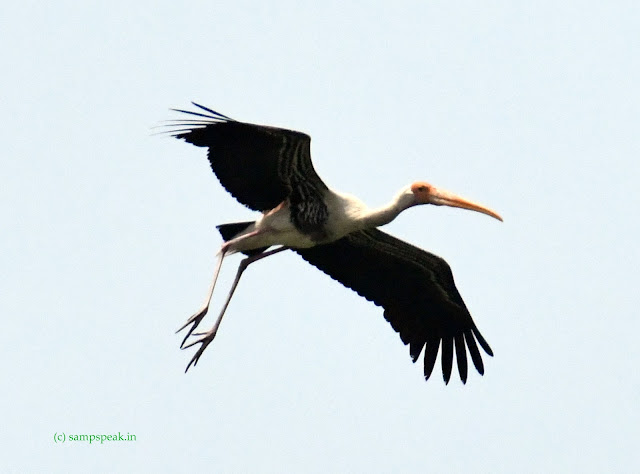Landing is a wonderful sight !
Painted storks have long slender legs ! - the one on the
picture appears to have even longer legs !!
Most of the aeroplanes designed
by humans need to land on smooth, standardized surfaces called runways. A bird, can use structures that vary widely in
diameter and texture, from overhead lines to branches to statues. How they transition from the air to a perch is a Nature’s
wonder.
தமிழ் இலக்கியம் மிக சிறப்பானது .. .. ஒருவர் தம் கருத்தை மற்றவருக்குத்
தெரிவிக்க இடையே பிறிதொருவரை அனுப்புவதே தூதாகும். தூதினைப் புறத்தூது, அகத்தூது என
இரண்டாகக் கூறுவார். தலைவன் தலைவியிடத்தே தூது அனுப்புதலும், தலைவி தலைவனிடத்தே
தூது அனுப்புதலும் அகத்தூது !! அரசர்கள், பகைவரிடத்துத் தூது அனுப்புதலும்,
புலவர்கள் புரவலர்களிடத்துத் தூது அனுப்புவதும் புறத்தூது -இதுவோ
தம் வறுமையை தம் மனைவிக்கு சொல்லிய தூது .. தூது செல்லும் பறவை 'நாரை"
.
நாராய் நாராய் செங்கால்
நாராய்; பழம்படு பனையின் கிழங்கு பிளந்தன்ன !
பவளக் கூர்வாய்ச் செங்கால்
நாராய் ;
நீயுநின் மனைவியும் தென்றிசைக்
குமரியாடி, வடதிசைக் கேகுவீ ராயின்
The painted stork
(Mycteria leucocephala) is a large wader in the stork family. It is found in
the wetlands of the plains of tropical Asia south of the Himalayas in the
Indian Subcontinent and extending into Southeast Asia. Their distinctive pink
tertial feathers of the adults give them their name. They forage in flocks in
shallow waters along rivers or lakes. They immerse their half open beaks in
water and sweep them from side to side and snap up their prey of small fish
that are sensed by touch. As they wade along they also stir the water with
their feet to flush hiding fish. The
only sounds they produce are weak moans or bill clattering at the nest.
Landing is an aviation
term that, for a bird, involves coming down on the ground for rest or looking
for food. High on the sky flying the
bird selects its ideal landing spot, then tucks its wings in and dives down with legs
open. Birds skillfully use their wings and also their tails to reduce speed,
and control their landing, enabling them to descend on a branch in such a way
as barely to disturb it. This is quite an acrobatic feat when one considers the
speed at which they approach the landing spot. Sometimes birds actually beat
their wings opposite the direction of flight to slow themselves down quickly.
They open their wings,
flap, make the increased surface area catch the wind - acting like a wind
break. In landing, birds use their legs and feet both as air brakes and to
grasp the perch or surface. Small birds often land by gauging a desired perch
and then by flying at a speed approaching zero at or slightly above the area;
the legs and feet then serve the simple function of grasping the perch. Obliged
to land at high speeds, most large birds use a ballistic approach !
Here is a Stork pictured
on air, preparing to land !
4.6.2023


Observing birds landing can be an enjoyable experience, especially in natural habitats or urban environments where bird populations are abundant. It offers an opportunity to appreciate their agility, elegance, and mastery of flight. Additionally, studying bird landing patterns can provide insights into their behavior, migration patterns, and habitat preferences.
ReplyDeleteBirds have specialized adaptations that allow them to land gracefully and safely. They use their wings, tail feathers, and body movements to control their descent and find a suitable landing spot. Different bird species may exhibit different landing techniques, such as gliding, hovering, or making a quick descent followed by a gentle touch down.
ReplyDeleteThis comment has been removed by the author.
ReplyDelete